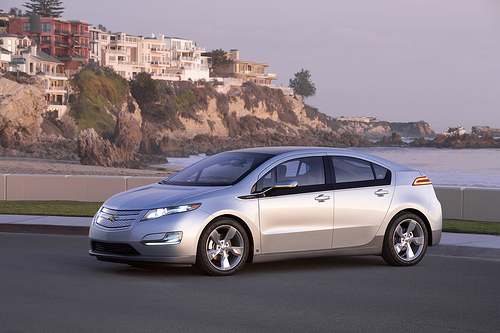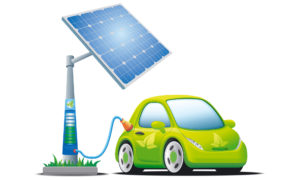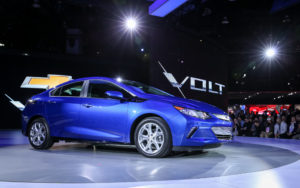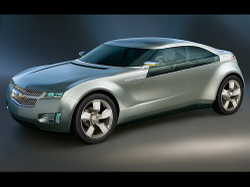The Chevy Volt is electrifying the car market – especially in the wake of the oil disasters in the Gulf of Mexico and now, Lake Michigan. Every one of us needs to stop using oil so the Volt, which can drive 40 miles on a battery powered by electricity rather than an engine fueled by oil, has a lot of appeal. General Motors, which is taking orders on the car for delivery this fall, claims the vehicle is “designed to move 75% of America’s daily commuters without a single drop of gas. That means for someone who drives less than 40 miles per day (which is most Americans), Chevy Volt will use zero gasoline and produce zero emissions.” After 40 miles, a smaller, 4-cylinder internal combusion engine uses premium-grade gasoline to produce more electricity, extending the car’s range an additional 300 miles.
I’d already been on Fox News talking about the Volt; now I jumped at the chance to do a test drive. I regularly get 45 mpg on my 2002 Prius, which I love. And last summer I test drove the Ford Fusion Hybrid for a week and loved it (even though its mileage, while better than a regular sedan, is still lower than the Prius.) But a car I can drive that gets 0 mpg – and still covers 40 miles? That sounded pretty good.
I drove over to nearby University of Maryland, where test drives were being conducted. I waited around for a few minutes until it was my turn to get behind the wheel. I slid into the driver’s seat, and turned the car on. Like the Prius, the car is very quiet – if you don’t know it’s coming, you won’t hear it, that’s for sure.
The car has a state-of-the-art dashboard so you can back-up without looking over your shoulder; constantly monitor how much fuel you’re using; stay connected to your Bluetooth technology if you use it; and enjoy the high-quality BOSE sound system.
It comfortably seats four people of average height. The seat sits low because the vehicle is so stream-lined, but consequently, it can be a little hard to see out the back or over your shoulder when you’re changing lanes.
Driving the car is simple as pie. I could only take it for a short spin around the campus, so I don’t know if it is as tricky as the Prius when it comes to achieving promised benefits: the Prius is supposed to get as much as 50 mpg, but it takes a very light foot on the pedal, and a lot of coasting downhill, to achieve those gains driving in the city. Most people speed rather than drive the limit; a lot of us race between stop signs and street signals, too, all of which reduce average fuel efficiency. I couldn’t drive the Volt long enough to know if personal driving style will prevent a driver from actually covering 40 miles on the single electrical charge as promised. That’s something worth paying attention to.
One added benefit of the Volt is that you can recharge it at home, with a standard 120-volt cable. And if you plug it in at night, the electricity you buy from your power company to pump into your car will be a bit cheaper.
Is the Volt an improvement over gasoline-powered vehicles? Absolutely.
Still, I can’t help but think that we’d all be better off not owning cars at all. We could walk and bicycle more in our neighborhoods, telecommute one or two days a week to work, carpool, shop online, use ZipCar or other car membership sites, or rent the new electric Nissan Leaf from Enterprise.
I don’t think I’ll be shelling out $40,000 for a Volt any time soon. It makes more sense, at least for right now, to drive less and follow these money-saving suggestions for saving gas when I do drive.

















6 thoughts on “Test Drive the New Chevy Volt With Me”
I Love the fact that there are hybrids..but the problem I see with it is the fact they make them so so freakin expensive.
So honestly the common person who is considered poor..which is the majority of us anymore cant even think about affording them.
I do agree we need walk and bicycle more..
But they also need to make it affordable for us to own them as well..
Acutually hybrid seem expensive but operating them is alot cheaper plus you have to remember you will be saving the planet from all the pollution. I 100% recommend walking and biking for healthy reasons and as way of saving money/energy-Thanks for the great post
I think the Volt is a great improvement, but I think it’s important not to conflate “I don’t need to put gas in the tank” with “fossil fuel free/no carbon footprint”. If you’re like most of us, that electricity you’re recharging the battery with is generated using oil, gas, methane, or coal. Granted, the overall efficiency of this electricity is much better than gasoline engines (100-300MPG equivalent depending on what numbers you’re looking at), but we shouldn’t talk about it as if fossil fuels are out of the picture. It’s also worth discussing the potential issue of lithium shortages and the environmental costs associated with mining and disposing of battery materials.
If we all moved to PLEVs we’d be in much better shape overall, but electricity generations and battery manufacturing concerns are at least worth a mention (even if the pros heavily outweigh the cons)
Thanks, Ben. You’re exactly right. That warrants a post on its own, in fact, which I will get to. The Volt is not a silver bullet, but if it gets other automakers to boost fuel efficiency and helps create a market for renewable energy, it will have served some useful purpose.
Re cost of hybrids: everything is sort of relative, isn’t it? A hybrid costs more than a conventional compact car, but not nearly as much as some of the larger sedans. I’m of the opinion that overall, cars won’t get any cheaper, but some cares (like hybrids) will become more affordable as they become more popular. But ultimately, the fewer cars any of us buy, the better!
The new Chevy Volt is going to be an instant success with local commuters that live near their workplace. For more 2010 Chevrolet Volt information including release date and MSRP updates as well as the important statistics you want to know including gas mileage (MPG) visit http://www.chevy-volt-2010.com .
Comments are closed.